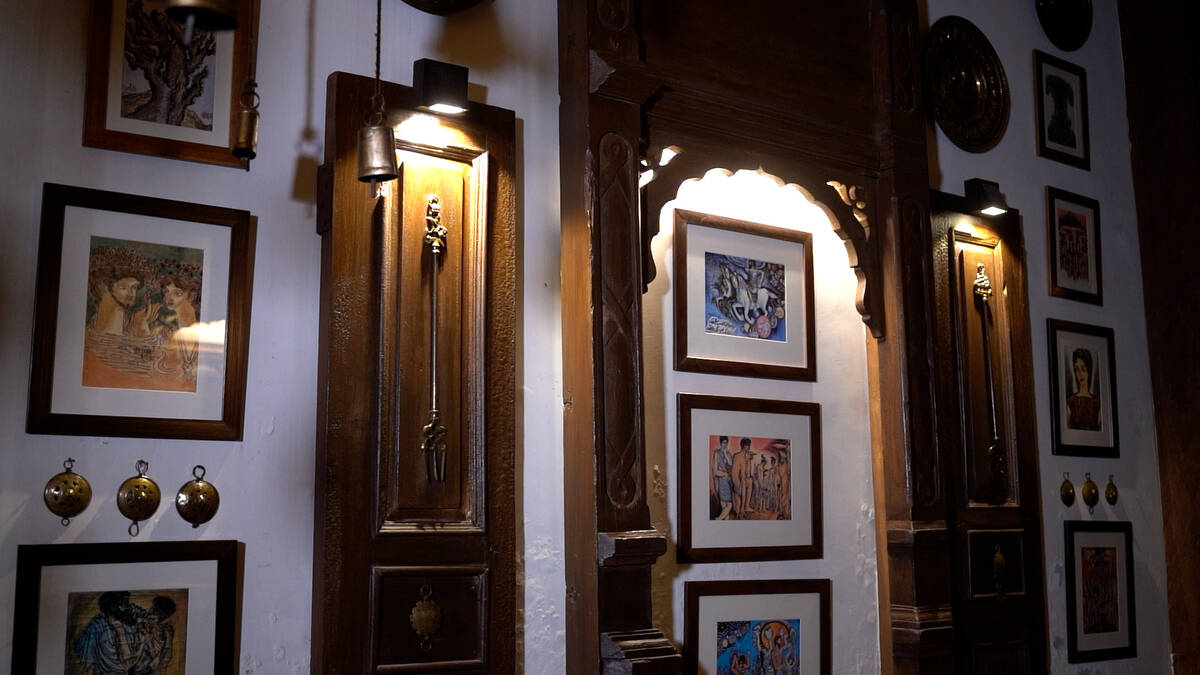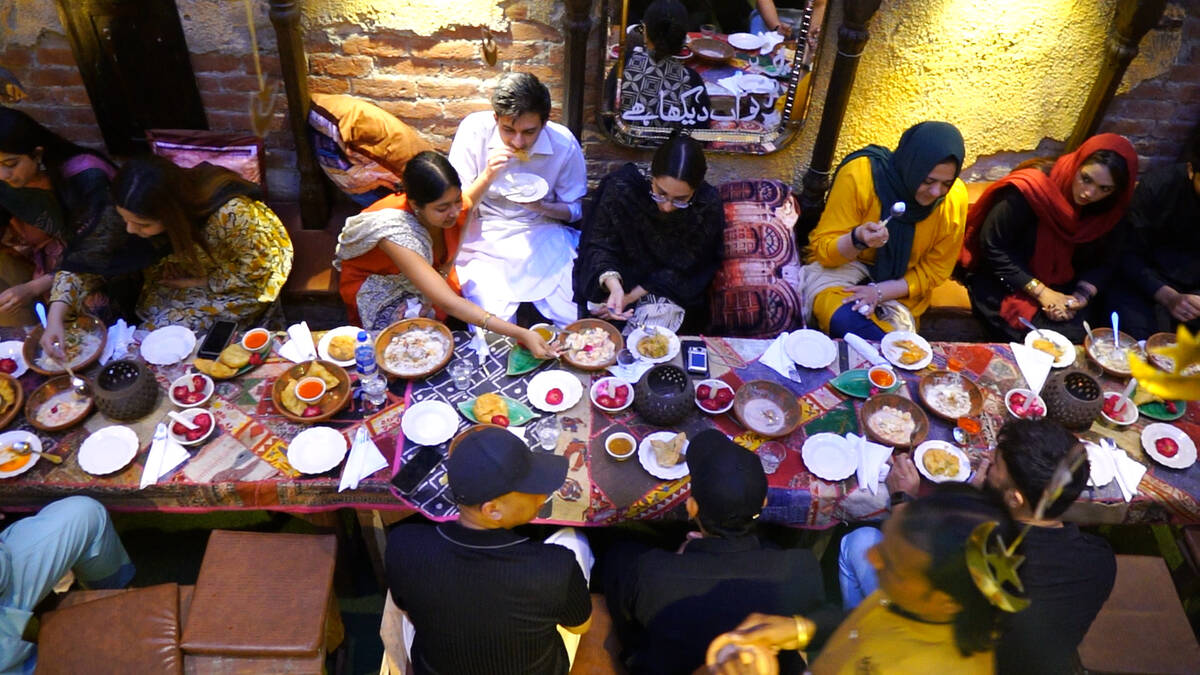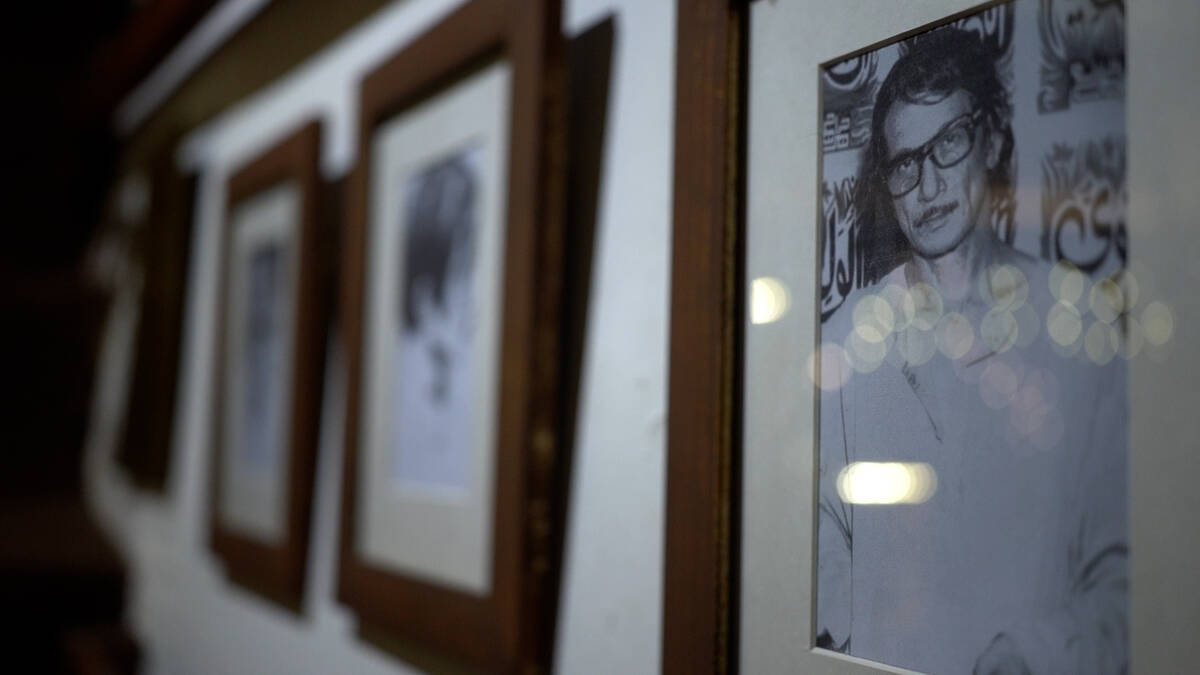LAHORE:┬ĀSet within the crumbling walls and narrow, meandering streets of LahoreŌĆÖs old, Walled City is Bethak Sadequain.
Opened in February, the cafe is named after Syed Ahmed Sadequain Naqvi (1930-1987), known by the mononym Sadequain, one of the finest painters and calligraphers Pakistan has ever produced and among the most influential and important South Asian artists of the 20th century. Apart from paying homage to Sadequain, the space also aims to revive the spirit of the bethak ŌĆö a traditional gathering space centered on conversation and connection. The venue, launched last month, has been drawing steady crowds this Ramadan with its curated iftar gatherings blending traditional cuisine and live music and presenting a glimpse into the history of a graceful and cultured city that stretches by some accounts back into the days of the epic Ramayana.┬Ā

The photo taken on March 25, 2025, shows Pakistani artist┬ĀSyed Ahmed Sadequain Naqvi's paintings displayed at a cafe named after him in Lahore's┬ĀWalled City. (AN Photo)
Situated on Gali Surjan Singh, a compact but architecturally rich lane in the Delhi Gate area, Bethak Sadequain outsources its food due to limited space but focuses on delivering an immersive cultural experience through live performances, an old-city charm and a communal atmosphere. The aim is to create a true bethak, which was a typical feature of many Mughal-era havelis, palaces and mansions in the Indian Subcontinent.
ŌĆ£Iftar is an excuse to get together, a communal experience. A lot of families come together, a lot of colleagues and friends get together, so our restaurant is a good place, close to heritage, close to tradition,ŌĆØ the restaurantŌĆÖs manager Bilal Sabir told Arab News.┬Ā
ŌĆ£The guests who come here [for iftar], we tell them a little of our history of the Walled City, we entertain them, we give them guidelines on music, we play for them our traditional Pakistani classical music too.ŌĆØ
Sabir described the business venture as an effort ŌĆ£to keep SadequainŌĆÖs name aliveŌĆØ as the extraordinary painter and calligrapherŌĆÖs work had not been given the due attention in Pakistan.

Visitors enjoy a┬Ācurated iftar at Bethak Sadequain cafe in┬ĀLahore's┬ĀWalled City on March 25, 2025. (AN Photo)
ŌĆ£We saw that in Lahore there is no activity related to Sadequain,ŌĆØ he said. ŌĆ£There is a Sadequain gallery, but itŌĆÖs in Karachi, not in Lahore. So we wanted to promote this thing, to announce and introduce Sadequain to Lahore, so this is just a little effort.ŌĆØ
ŌĆ£INTRODUCING SADEQUAIN:ŌĆØ
While the iftar menu also provides an authentic Walled City experience ŌĆö stuffed dates, samosas, signature tea, spiced biryani rice and shahi haleem stews ŌĆö the success of the restaurant this Ramadan is still largely due to its ambiance and classical vibe.
Before iftar earlier one evening this week, Sabir sat on the floor and played the flute, a traditional wooden wind instrument, surrounded by SadequainŌĆÖs works, and interacted with the audience, sometimes asking them to guess the tune and also encouraging people to sing along.┬Ā
Zeeshan Zia Raja, the restaurantŌĆÖs owner, said she opened it as she wanted to do something meaningful during her retirement as well as create a space in the Walled City where women could sit comfortably and safely for hours.
Raja, also the owner of the American Lycetuff School System, represents the Sadequain Foundation USA.
ŌĆ£The new generation is missing a lot, many important things in their lives,ŌĆØ she said. ŌĆ£So, I thought we should introduce Sadequain. We, as a nation, have not done justice to him by recognizing his efforts for Pakistan and what he did for us.ŌĆØ
Sadequain, born in Amroha in 1930 to an educated North Indian Shia family in which calligraphy was a highly valued skill, rose to fame in 1955, when he exhibited a number of works at the residence of Prime Minister Huseyn Shaheed Suhrawardy, a liberal patron of the arts.┬Ā

The photo taken on March 25, 2025, shows Pakistani artist┬ĀSyed Ahmed Sadequain Naqvi's pictures displayed at a cafe named after him in Lahore's┬ĀWalled City. (AN Photo)
Soon afterwards, Sadequain received a number of important governmental commissions for municipal murals, and held numerous solo exhibitions of his work. It was around this time that the influence of Picasso began to appear strongly in SadequainŌĆÖs paintings and sketches, according to his biography on the website of the Grosvenor Gallery in the UK where some of his works are displayed.┬Ā
Sadequain won the Pakistan National prize for Painting in 1960, and left for Paris later that year at the invitation of the French Committee of the International Association of Plastic Arts.┬Ā
ŌĆ£The following few years were to be some of the most important for the young artist in terms of his artistic development, and it was whilst in Paris that he began to achieve international critical acclaim,ŌĆØ the gallery wrote.┬Ā
In September 1961 he was the laureate winner of the Paris BiennialŌĆÖs ŌĆśArtist under 35ŌĆÖ category, and was awarded a scholarship which allowed him to remain in Paris, and helped catapult him into the spotlight. During the early 1960s he traveled to Pakistan as well as throughout Europe and to the USA, and held numerous solo-exhibitions, including at the Commonwealth Institute Galleries and New Vision Center, London, and at Galerie Presbourg and Galerie Lambert in Paris.
In 1964 he was awarded the commission to illustrate a new edition of Albert CamusŌĆÖ novel LŌĆÖEtranger, published in 1966 by Les Bibliopholes de LŌĆÖAutomobile Club de France.┬Ā
Sadequain returned to Pakistan in 1967 following his fatherŌĆÖs ill health during a visit to France. His output for the next few years was prolific and in the early 1970s he published a huge volume of poetry. It was also during this period that he concerned himself mainly with calligraphy, as well as with state funded murals, including those at Mangla dam, The State Bank of Pakistan, and the ceiling of Frere Hall, Karachi.
Mukarram Zia Raja, who is Bethak SadequainŌĆÖs co-founder, recounted the history of SadequainŌĆÖs life and work and told Arab News the plan was always to make the venue all about the artist, as well as about art and music in general.┬Ā
An entire floor of the restaurant is dedicated to Sadequain. With the blessings of the Sadequain Foundation, dozens of memorabilia from his life and work ŌĆö official prints and private photos ŌĆö are on display to make young people more curious and encouraged them to learn about the great artist.┬Ā
ŌĆ£My mother grew up hearing about all these bethaks in the Walled City, lost to time, and she wanted to bring them back,ŌĆØ he said. ŌĆ£But when we got this place, it had just been a warehouse of dry food inventory for the past 60 years. So, she wanted to do something of cultural significance with it too.ŌĆØ
But in Ramadan, serving a good iftar was also key.┬Ā
ŌĆ£Food culture and Lahori culture is so ingrained together that you canŌĆÖt run a successful business if you are not doing good iftars during Ramadan,ŌĆØ Mukarram said.
ŌĆ£But we did not want to do a random cash grab for Ramadan, so even all the decor we did was very traditional ŌĆ” Even the choice of music was not random, curated to feature sufi kalaams and naats [spiritual poetry and devotional songs], given that it is Ramadan.ŌĆØ
















